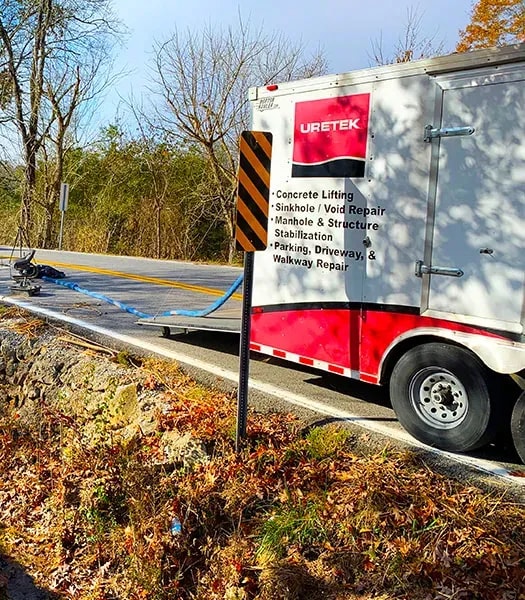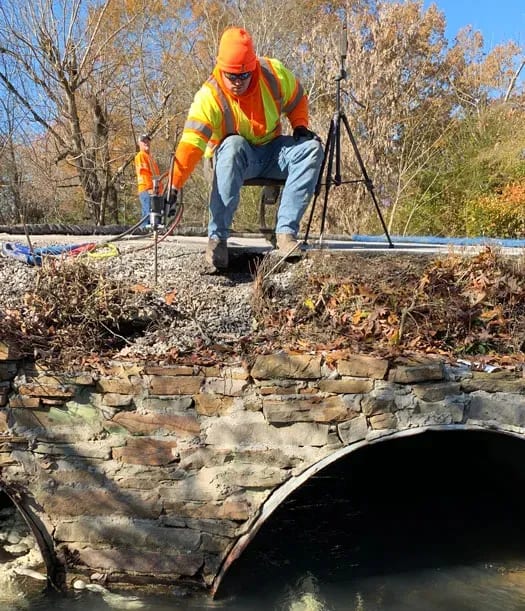State Highway 283 Culvert Repair in Tennessee
Problem
When driving Tennessee’s rural highways, part of the fun comes from knowing the roads and views have remained unchanged for years. But along a stretch of Highway 283, dangerous voids were opening up behind a mid-20th century headwall and in proximity to two large corrugated metal culverts. Without an intervention of some kind, a pretty drive was going to be spoiled for a long time and at great expense for TDOT Region 2 engineers responsible for the maintenance of the state’s scenic roadways. With citizen safety a priority, TDOT contacted URETEK.
Analysis
URETEK crews arrived on the scene and inspected the culverts. The corrugated metal pipes appeared to be in sound condition, but the voids opening around them were a concern. Close inspection indicated that the voids were likely caused by water flowing through or under the old headwall structure, or through the joints between the headwall and the two pipes. URETEK recommended a combination treatment involving new material to fill the voids and URETEK Deep Injection® (UDI) stabilize the new material and the area all around the headwall.
Solution
TDOT agreed to fill the visible voids with #57 stone from the surface. URETEK performed UDI to place polyurethane grout into the soils between and around the culvert pipes, and just behind the stone headwall. The injection pattern was designed to fill the existing voids and mitigate the path of water flow that had created the voids. Finally, it was agreed that UDI would provide additional future strength to the underlying soils in proximity to the headwall and the two culverts.
Result
URETEK’s hydro-insensitive polyurethane grout effectively filled the voids and stabilized the soils supporting the road above the culvert. Grout surfaced in several locations around the headwall and inside the pipes, indicating that multiple paths of water flow had been intercepted and mitigated. The entire job was completed in only half of one day, with TDOT personnel providing traffic control on this lightly used rural highway. Any minimal traffic delays surely went unnoticed by area travelers enjoying the view along Tennessee’s lovely Highway 283.
URETEK Deep Injection® (UDI)
Widely referenced throughout our industry, UDI involves the injection of structural polymer into base and subgrade soils to increase the load bearing capacity. This is achieved by injecting the polymer through small holes drilled directly through the pavement structure to depths determined by site-specific analysis. Our URETEK 486 Star® material flows easily into voids and weak zones within the soil mass below. Through a controlled chemical reaction, the expanding polymer compacts surrounding soils and applies a controlled pressure on targeted areas of the affected pavement above. If needed, a multi-injection design plan is utilized to gently return the pavement to its original grade. The composite material quickly cures into a strong, dimensionally stable, and water-resistant geo-material, providing years of reliable service.
URETEK 486 Star®
URETEK 486 Star® polymer is a two-component, high-density, expanding thermoset polyurethane system. It was developed to be the ideal solution for under-sealing, void filling, lifting of settled pavement, stabilization and stiffening of weak soils, and for encapsulating and sealing buried infrastructure. URETEK 486 Star® is environmentally inert, non-toxic, and resists underground water erosion or weakening due to its industry-leading hydrophobic properties.


